Students Push Back Against the Administration’s Thoughts and Prayers
Fordham’s relationship with its Black students, the NYPD and Aramark
June 3, 2020
On May 29, a petition was started asking Fordham to release a statement on the recent incidents of police brutality. It had been four days since George Floyd, an unarmed Black man, was killed by a white police officer kneeling on his neck for more than eight minutes, despite it being an unapproved use of force by the Minneapolis Police Department (MPD). This was just the latest in a series of killings of unarmed Black citizens, including Breonna Taylor, Tony McDade, Ahmaud Arbery and — on New York’s own Staten Island — Eric Garner.
Protests had erupted across the country. What started one night in Minneapolis spread across the United States. The petition garnered thousands of responses — as of June 3, it has been signed over 2,000 times — and a statement was released by the university in a community-wide email on May 30.
Rev. Joseph M. McShane, S.J., university president, wrote, “we will pray for the repose of the souls of George Floyd and Ahmaud Arbery. We will also pray for their families as they wrestle with the losses they have suffered in and through the deaths of those whom they loved so dearly … But, let’s be honest. That is not enough. We must do more.”
He continued, “we must recommit ourselves to the work of educating for justice and to doing all we can to figure out how our beloved nation … has allowed itself to stray from the ideals (and the promises those ideals hold out to all) upon which it was founded.”
However, McShane did not include any substantial actions here that the university would be taking toward combating the racial inequality at the root of the issue. Many students took notice of this lack of call to action and began expressing their thoughts.
Fordham Lincoln Center (FLC)’s Black Student Alliance (BSA) said that they are “deeply disappointed in both the delay in Father McShane addressing the Black lives matter movement and George Floyd’s death and the way it was addressed.” They asserted that McShane’s message showed no plan to make Fordham safer and more inclusive for Black students and no pledge to donate to Black causes.
Fordham has long touted the idea of being “men and women for others.” In the past week, its students have created petitions, sold art to raise donations for places like Black Visions Collective and hit the streets to protest. They have engaged with their community and the world around them.
The Fordham administration has not signaled the same. Daejah Woolery, Fordham College at Lincoln Center (FCLC) ’22, was one of the commenters on Fordham’s Instagram post showcasing the statement — and she wasn’t pleased.
“My biggest issue was that this institution had only words. Words do not protect the lives of their Black students. When I heard that the University of Minnesota severed their connection to the MPD I had some hope that Fordham would do the same with the NYPD. But no,” she wrote in an Observer interview.
Fordham’s Long-Term Connection With NYPD
Fordham’s close ties to the New York Police Department (NYPD) was a point of concern that several students echoed. FLC BSA wrote, Fordham “shows no plan to divest itself from the NYPD which is responsible for the regular murder of Black new yorkers and is one of the most racially violent police forces in the U.S.”
Almost 50% of those killed by the NYPD from January 2013 to December 2019 were Black. For reference, approximately 25% of the population of New York City identifies as Black or African American.
Fordham’s relationship with the NYPD runs deep. All of those in the Public Safety administration are former ranking members of law enforcement, and the current Chief of Public Safety, John Carroll, said he is “personal friends” with NYPD Police Commissioner William Bratton’s top advisers in a 2014 Fordham Ram interview.
He also stated that Fordham would “maintain its ‘strong relationships’ within the NYPD, which extend from local detectives to narcotics special victims and precinct commanders to top borough commanders in the Bronx and Manhattan.”
Carroll noted that it was unfortunate that former commissioner Raymond Kelly “got painted with this stop-and-frisk brush, instead of being thanked for driving homicides down to the 1950s levels.”
Stop-and-frisk was a controversial program that peaked under Kelly’s administration, allowing officers to stop someone and search them if they had “reasonable suspicion.” Due to this vague phrasing, officers could stop people indiscriminately. In 2011, at the height of stop-and-frisk, 53% of those stopped were Black and 88% of the 685,724 recorded stops were innocent.
Fordham did not mention its relationship with the NYPD in the statement.
Woolery suggested that Fordham disconnect from the police force, writing, “stop hiring almost exclusively from former NYPD officers and stop mentioning that as a marketing and selling point. It dismissed the trauma some students face because of the police.”
Other schools have echoed this suggestion. In the wake of Floyd’s death, the board of Minneapolis Public Schools voted unanimously on June 2 to terminate the district’s contract with the MPD.
Although students’ parents might associate the presence of former NYPD officers on campus as a mark of safety, Woolery argued that “The NYPD is still around because this is still NYC but if they feel safer because of NYPD links on campus they should consider the privilege they have to feel safe around ANY former or current police officer, let alone the New York Police Department. Because George Floyd said, ‘I can’t breathe’ but so did Eric Garner.”
Fordham’s Ties With Aramark
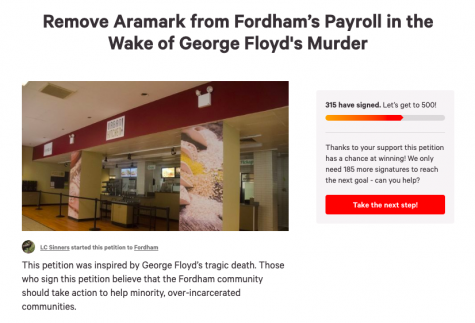
Some students have also started a petition that began circulating via social media for Fordham to remove food service provider Aramark from its payroll. Aramark is the corporation that receives the highest financial compensation from Fordham. A large portion of Aramark’s income comes from the private prisons to which it supplies meals. This feeds into the prison-industrial complex, which turns the prison system into a business. NYU let go of Aramark last fall with this being one of the primary reasons students pushed them to do so.
The Atlantic reported, “Although the prevalence of illegal drug use among white men is approximately the same as that among Black men, Black men are five times as likely to be arrested for a drug offense.”
“As a result, about half the inmates in the United States are African American. One out of every fourteen Black men is now in prison or jail. One out of every four Black men is likely to be imprisoned at some point during his lifetime.”
Aramark profits from this industry, and Fordham in turn profits as a school from using their services.
The quality of food that Aramark provides in prisons is also extremely poor, and the meals offered often, according to the San Francisco Bay View, “fell far below the daily minimum 2,500 calorie diet the courts have constitutionally required prisoners receive.”
Here at Fordham, similar complaints have been made about the quality of the meat and produce Aramark serves. Additionally, in October 2019, a dead mouse was found in one of the salad containers in the FLC Community Dining Hall.
It is true that backing out of a dining contract is no small matter, but Fordham has done so before in 2016 after concerns over food quality from provider Sodexo. In an email on April 22 amid concerns over the employment of contract workers, McShane wrote that “It simply is not possible for Fordham to accept financial responsibility for its vendors’ employees.” It can be assumed from this that switching contracts would result in a loss of employment for the current dining workers.
Fordham did not acknowledge its ties with Aramark in the statement.
Black Student Enrollment at Fordham
Fordham’s enrollment rate of Black students has also failed to rise since the end of the 20th century, staying at 4.4% of the undergraduate population. For the Class of 2023, there was only a 2% increase in overall acceptances for Black students. As of spring 2020, they comprise 4% of their class.
Fordham has a Scholarship for Semifinalists that allows high-achieving, low-income Hispanic students to overcome fiscal obstacles with a full-ride tuition — but nothing similar has been done for low-income Black students. Fordham has been repeatedly called to take more initiative to increase the Black student population of both campuses to better reflect the communities Fordham lives in.
Fordham did not mention any enrollment initiatives it would take in the statement.
Community Reactions to the Statement
The president of ASILI, Rose Hill’s Black Student Alliance, Diontay Santiago, Gabelli School of Business at Rose Hill ’21, wrote, “I am grateful for the statement being issued eventually. HOWEVER, as the many enraged comments on the statement’s Instagram post says, there are a lot of vague platitudes and it seems as though the university is tip toe-ing around making a clear stance.”
An alumna, Katrina Feldkamp, Fordham College at Rose Hill ’14, echoed Santiago’s sentiment, commenting on Fordham’s Instagram post, saying in part, “What are you doing to uplift and respond to the demands of Black students and non-Black POC (person of color) students that are calling out problems on your campus — because I recall us being repeatedly silenced during my time as a Fordham student. What are you doing to project and center your students who are subject to racist attacks from their white classmates—a problem when I was a student there and one that continues for current students.”
The protests in NYC reached both of Fordham’s front doors at Lincoln Center and Rose Hill. On June 1, Fordham Road was looted, leaving the businesses that many students utilize throughout the year in disarray. The following day, the Bronx community came together on a cleanup mission.
Fordham released a statement on June 3 via Instagram that stated, “many departments and units across the University began identifying and implementing ways Fordham could work in solidarity with community residents, organizations and businesses … for example led by students and joined by staff, Fordham community members participated in early clean up efforts along Fordham Road.”
This statement was released after FLC BSA started a petition on the same day for Fordham University to fund local organizations. The petition reads, “As an act of solidarity with its Black students and neighbors, we urge the university to use its position of authority and influence to provide financial support to organizations that have been working tirelessly to combat racism in the United States.”
During this time of need, there are many ways to be anti-racist and stand up against injustices. There are countless opportunities to sign petitions, donate funds, raise awareness and educate yourself — these are only the beginning stages of working towards change.
Woolery outlined what she would like to see Fordham do: “disconnect with the NYPD … commit to a donation … mobilize staff that lives in and near campus to help the community … and I would announce a curriculum re-evaluation by all departments to ensure that anti-racism is a core value in the process of cura personalis. I’d hold forums of some sort inviting students of color to get on Zooms or something and directly air their grievances about administrative policies to key administrators.
“So when Fordham students leave as ‘men and women for others’ the school has done everything in their power to make sure all people are included in ‘others,’” she wrote.
Fordham has changed things in the past when it was deemed necessary. Administrators formed a Task Force on Diversity to observe the campus climate in 2015 as a response to ongoing “bias incidents.” There is a webpage devoted to “Diversity Inclusion Initiatives.” Fordham even received an award in 2019 for their “sustained excellence in fundraising programs.”
As of June 3, nine days after Floyd’s death and four days after an official university response, Fordham has still not taken any concrete action. The Observer reached out to Bob Howe, assistant vice president for communications, for comment, but did not receive a response.
In order to provide spaces of support, Fordham’s Counseling and Psychological Services released two virtual support groups for the Fordham community to join on June 3. One is for African American and Black-identified students to heal and be empowered. Another is for students of any racial/ethnic identity to be an ally and support Black communities.
McShane concluded his message with the line, “You are in my thoughts and prayers today and every day,” a phrase that has come to be synonymous with inaction. A Jesuit saying attributed to St. Ignatius of Loyola and endorsed by Fordham is, “go forth and set the world on fire.” The question many students are asking right now is: Will Fordham follow through on the Jesuit mission it preaches?

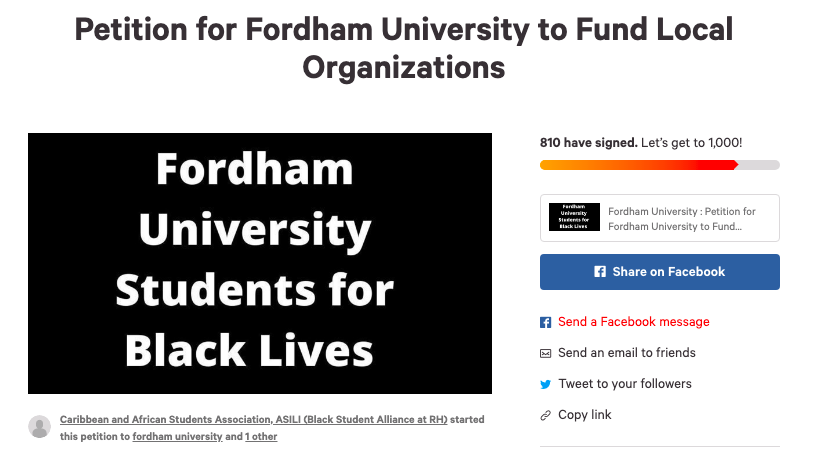
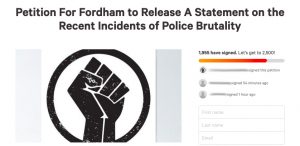

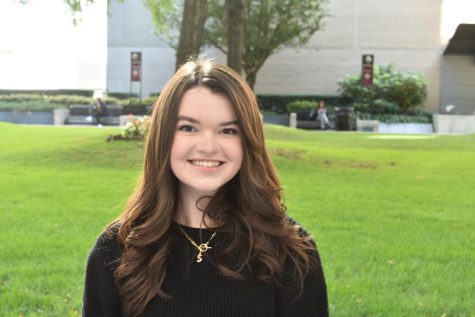
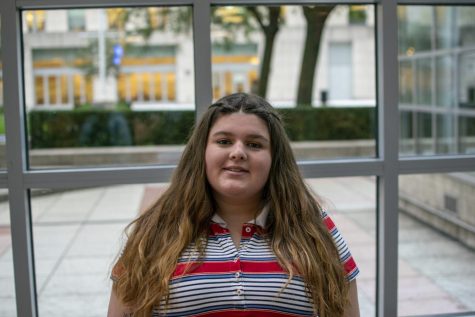









Trevor • Jun 4, 2020 at 12:13 pm
I think it is foolish to call for a complete disconnect from the police. It seems many students are painting the 40,000 police officers of the NYPD as all racist. Yes, the NYPD has a long history of racial profiling and failing NYC’s minority community. However, calling for a complete ending of Fordham’s relationship with the NYPD is arrogant, foolish, and naive. The solution to ending police brutality and racial bias lies in improving the community’s relationship with the uniformed. Anti-police sentiment is echoed by many Fordham students will only result in our relationship with the NYPD deteriorating further. Fordham should focus on reforming its relationship with the NYPD; ensuring its officers are mindful of racial prejudice and discrimination on the job. We should press for an end to the heavy-handed tactics used by the NYPD, call for more transparency in police investigations, and call for more of an emphasis on racial-awareness training programs for recruits and current officers.
If current Public Safety Officers have a history of racial incidents against Fordham students, they should be fired – plain simple. Instead of not hiring ex-officers, Fordham should vet potential Public Safety Applicants more rigorously. We should not, however, completely divest from the NYPD. The NYPD forms the backbone of crime-prevention and crime-fighting in the city and around our campuses. To end our relationship with the NYPD, would be in a slap in the face to the future potentiality of reform, worsen already existing relationships with the police, and threaten the safety of our campuses and neighborhoods.
So get off your emotional high-horse and think for a moment.